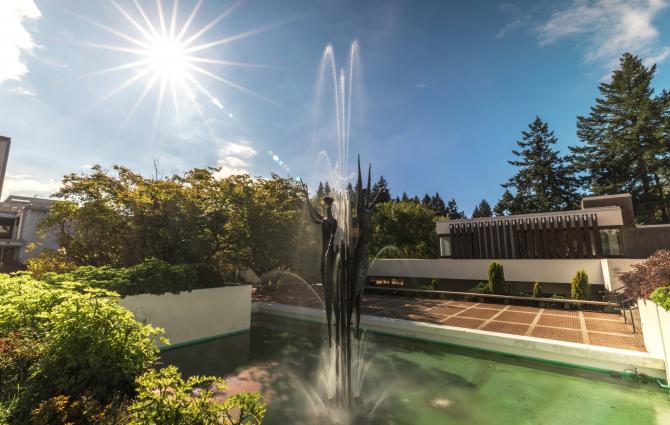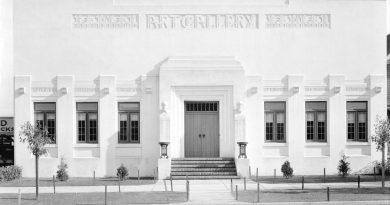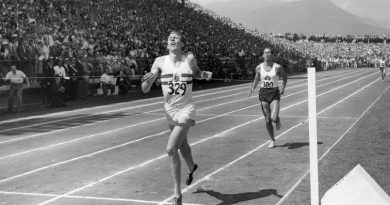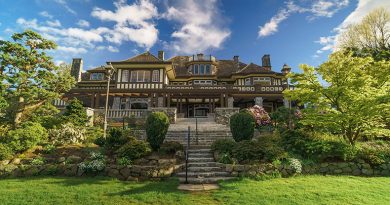1961
Above: Transcendence, a sculpture by Jack Harman, was placed at UBC.
[Image: www.students.ubc.ca]
*****************************************
You’ll note that these years include events listed under “Also in . . .” These are events for which we don’t have a specific date. If YOU know the specific date of an event shown there, please notify us . . . and cite the source! Many thanks!
*****************************************
January 1 Norm Grohmann got into radio at CHWK in Chilliwack in the 1950s, and joined CKNW today. For four decades he cut a goofy swath through local radio in a range of voices, culminating in a daily bit with NW’s morning man, Brian ‘Frosty’ Forst, where he played a vast variety of people—none of them normal, all of them loud and funny—discussing the weather. BCTV asked him to do the same, and viewers loved him. He stayed 25 years. Then Grohmann—born August 13, 1935 in Vermilion, Alberta—made a career switch into acting on stage. He was a hit (singing!) as Fagin in the Royal City Musical Theatre version of Oliver!, another hit in Sylvia, and keeps returning to the Arts Club Theatre as fussy, neurotic Felix Unger in The Odd Couple. He was recently in the cast of The Music Man as Mayor George Shinn.
January 14 Gertrude Guerin became the first woman to be elected chief of the Musqueam Indian Band. The Musqueams make their home on the north shore of the Fraser near the university.
January 15 The Coquitlam River floods, prompting an extensive dyking and drainage program.
January 27 The anchor from a 19th century sailing ship was found near Centennial Pier.
March 1 Ian Dobbin became manager of the Queen Elizabeth Theatre.
March 15 Broadcaster Ted Field was born.
April 13 The Soviet Union’s Yuri Gagarin orbited the earth, the first human into space.
April 22 North Vancouver’s Lions Gate Hospital, the fifth largest in the Greater Vancouver Regional Hospital District, opened at its current site with 285 beds.
May 3 An 11-day B.C. International Trade Fair opened at Exhibition Park.
May 8 Businessman Jimmy Pattison began his rise in business when he bought a GM dealership (Pontiac/Buick) with a $40,000 bank loan from the Royal Bank, using his home and life insurance policy as collateral. Today, Pattison runs B.C.’s largest privately-owned company, the Jim Pattison Group.
May Originally housed downtown at the corner of Richards and Davie, CHAN-TV moved to a sprawling complex in Burnaby’s Lake City. See October 31 below.
June 1 In the Province: “A permanent sales force has been set up by the Greater Vancouver Tourist Association to sell Vancouver as a convention centre… staffed by a man and 2 women, financed by district hotels and motels.”
June 5 Direct distance dialing began in Vancouver.
July 1 Emily Carr Elementary School in Vancouver was named.
Also July 1 Michelle Wright, Canadian country singer, born.
July 28 Dal (Albert Edward) Grauer, former president of the B.C. Electric Railway, died in Vancouver, aged 55. “He was born,” writes Constance Brissenden, “January 21, 1906 on Sea Island, Richmond. He was the sixth son of pioneer John (Jacob) Grauer (1861-1936) He attended King Edward High School, earned a BA in Economics at UBC and a PhD at Berkeley. He was named Rhodes Scholar in 1927, earned a BA at Oxford. As a young professor and head of social sciences at the University of Toronto, he assisted the Bank of Canada and the Rowell-Sirois Commission. He was appointed secretary of the BCER in 1939. Later, as president, Grauer took the company (now B.C. Hydro) through major expansion. At various periods he was chairman of the Vancouver General Hospital Board; president of the Vancouver Symphony Society, and chancellor of UBC. His daughter is artist Sherry Grauer.”
August 1 The British Columbia Electric Company became a new provincial crown corporation, B.C. Hydro and Power Authority. Dr. Gordon Shrum was the first Chairman. Hugh Keenleyside stepped down as chair of the B.C. Power Commission to become co-chair. He would hold that post until 1969.
At the time the tallest building in Vancouver, the 21-storey B.C. Electric Building at 970 Burrard at the corner of Nelson, the first highrise built south of Georgia, was renamed the BC Hydro Building. (Province columnist Eric Nicol, noting the monumental Saint Andrew’s-Wesley United Church across the street, called the intersection ‘The Power and the Glory.’) This was the first post-war structure in Vancouver to become a heritage building. Today, it’s a 242-unit condominium called the Electra.
August 27 Harry Schiel started a short-lived series of midnight shows at the Majestic Theatre, 20 West Hastings (formerly the Pantages, now gone). The last show was February 11, 1962.
Summer Radio CKLG, which had gone on the air in 1955 in North Vancouver, was taken over by new owners, who moved it to Vancouver.
September 18 Alexander Russell Lord, educator, died in Vancouver, aged 76. He was born June 27, 1885 in Merigomish, Nova Scotia. Lord attended Queen’s (BA, 1910). Principal of Kelowna Elem. (to 1916), then school inspector for Prince Rupert/Peace River districts, Okanagan and Vancouver. Joined Vancouver Normal School (1924-50), retiring as principal. Special lecturer, College of Education (1950-58). Member, UBC senate (1936-50). LL.D (UBC, 1948). President, Canadian Educational Association (1948-49) and Children’s Aid Society. Educational advisor to the UN. Awarded Fergusson Memorial Award (1950) for “outstanding contribution to education in B.C.” LL.D (UBC, Queens). An elementary school in Vancouver is named for him.
October 9 Anna Ethel Sprott, radio school founder and alderman, died in Vancouver, aged about 82. She was born c. 1879 in Norwood, Ontario. She attended the University of Toronto. Writes Constance Brissenden: “She came to Vancouver as a young widow in 1911 and attended Sprott-Shaw Schools of Commerce, Radio and Telegraphy. In 1918 she married its founder, R.J. Sprott. After his death in 1943 she became president of the company. She was the founder of the West Coast Radio School. The first woman candidate put forward by the civic Non-Partisan Association, she was elected a Vancouver alderman in December 1949, and served on council to 1959. She was the first woman alderman elected for three terms, served longer than any woman in the city’s history. Sprott was the first woman to serve as acting mayor (September 1953). On her retirement, she admitted to writing secret letters on council’s behalf to those celebrating their 50th and 60th anniversaries and 90th or 100th birthdays.”
Also October 9 Alice Frances Crakanthorp (née Patterson), a pioneer student, died in Haney, aged 97. “She was born February 26, 1864 in Alberni,” Constance Brissenden writes, “the first white girl born in the Alberni area. At age 9 she moved with her parents to the shanty town beside Hastings Mill. She was the last surviving student of the first class at the mill school, located at what is now the foot of Dunlevy Street. Alice’s dancing slippers, worn to the opening ball of the first Hotel Vancouver [1888], were donated to Vancouver City Archives.”
October 13 The RCMP raided Vancouver bookstores and the main library to seize copies of Henry Miller’s novel Tropic of Cancer. Today, you can buy the book at any bookstore.
October 31 Vancouver’s first private television station, CHAN-TV, began broadcasting on Channel 8.
November 2 Sam (S.W.) Randall, thoroughbred racing promoter, died in Vancouver, aged 79. He was born September 25, 1882 near Toronto. In 1908, Randall left Toronto for Vancouver with his wife Sarah Catharine (d. 1951). Two friends got him involved in racing; he took over Exhibition Park in 1920. He operated Lansdowne Park on Lulu Island from 1924 to 1945, then managed Victoria’s Willows Track until 1947. For 35 years he was president and director of the Ascot Jockey Club and Vancouver Thoroughbred Association. Randall was the first Canadian track owner to adopt the photo finish, and the first western manager to install an electric starting gate (1939). He sold Lansdowne Park and the Randall Building (535 W. Georgia) in 1945, reportedly for $1 million. He established the S.W. Randall Plate. He has been inducted into the B.C. and Canadian sports halls of fame, was called “Mr. Racing” in BC. See this site.
November 12 Romanian gymnast Nadia Comaneci was born in Onesti, Moldava in Romania. She was the star of the Montreal Olympics in 1976 at age 14 when she became the first gymnast in Olympic history to be awarded the perfect score of 10.0. See this document.
December The Christmas Carol Ships tradition began.
Also in 1961
By 1961 the metropolitan Vancouver population had climbed to more than 800,000, double the figure of 20 years earlier, and pushing Vancouver’s share of the population down to 46 per cent. For the first time there were more people outside the city proper than in.
David Suzuki, born in Vancouver March 24, 1936, earns a PhD in genetics from the University of Chicago. More at this site.
UBC opened the School of Rehabilitation Medicine to help relieve a shortage of therapists.
The West Coast Railway Association was incorporated as a non profit society. “Its goal is the Preservation of Railway Heritage in Canada, particularly British Columbia and the West. It is one of the larger non profit societies in the province, having over 1,500 active members who restore, preserve and maintain vintage railcars as well as administer and volunteer in the Association’s activities.”
UBC’s Dr. Frederick Soward, 62, was named dean of graduate studies. He will hold that post to 1965.
One branch of the Taylor family of Delta ends a 56-year tradition of running the post office in Ladner. They began in 1905, passing control on from father to son to daughter-in-law.
Burnaby holds its final May Day celebrations. With one interruption because of the Second World War, the annual event has been held since 1925.
Surrey municipal employees went on strike for the first time.
The Crescent Apartments was West Vancouver’s first high-rise condominium.
In 1961 60 per cent of Richmond’s population was of British descent. That now began to change.
Milltown to Metropolis, a history of Vancouver by Sun journalist Alan Morley, was published to commemorate the city’s 75th birthday. This is an excellent book. It went to three editions, the last in 1974. Morley died in 1982.
Writer Sean Rossiter says 1961 was an architectural turning point for Vancouver. “The history of Vancouver architecture,” he wrote in The Greater Vancouver Book, “consists of everything before Arthur Erickson, and everything since. In 1961 Erickson and Woodruff Wilson ‘Bud’ Wood were teaching a more design-oriented architectural approach at the University of Oregon. Erickson was already designing houses in Vancouver that he regarded as experiments; one, for example, entirely out of concrete blocks. Wood became perhaps the most important design mentor at UBC’s architecture school over three decades.
“Ron Thom, the outstanding designer in Vancouver before Erickson,” Rossiter continues, “was off to Toronto that year to build Massey College and thus become the first local architect with a national practise. Thom was a protege of the most influential architect ever to work in Vancouver, C.E. ‘Ned’ Pratt, whose firm, Thompson Berwick Pratt & Partners, had by then become the dominant office in the city.
“The founders of many of today’s important firms were either working for Pratt or about to work for Erickson in 1961.”
Transcendence, a bronze sculpture by Jack Harman, was placed at the Thea Koerner Graduate Student Centre at UBC. Cast at his North Vancouver foundry, this piece was the sculptor’s first commission. “When he suggested the design should be larger to balance the bulk of the building behind it,” journalist Elizabeth Godley wrote, “the Koerner family doubled his budget.”
The Sopron Forestry School at UBC, its faculty and students refugees from Hungary, closed its doors when the last of its 140 students had graduated. See January 24 in the 1957 chronology for a fuller treatment.
The census showed there were 2,200 Hungarians living in Vancouver.
There were 15,223 Chinese in Vancouver (298 of them in Richmond), double the number of a decade earlier. The number would double again by the 1971 census.
Surrey’s Senator Reid Elementary School, named for Scotland-born Senator Tom Reid, opened. Reid was a Surrey pioneer. He gave the municipality land that is now Bear Creek Park.
John Henderson (1880-1968) was named Vancouver’s Good Citizen this year because of his long service in a score of organizations and many personal accomplishments. He would be a Vancouver School Trustee for 21 years, beginning in 1943.
The Chemical Engineering Building was built at UBC.
UBC’s Department of Asian Studies was founded. It offers both undergraduate and graduate degree programs. The Asian Library there is the largest Asian-languages library in Canada with more than 300,000 volumes in Chinese, Japanese, Urdu, Sanskrit and other Asian languages. It has an important collection of Chinese rare books and manuscripts dating as early as 986 A.D.
UBC’s Graduate Student Centre (Thea Koerner House) was completed. The Centre was a gift to UBC from Dr. Leon Koerner, the founder of Alaska Pine Co., and was named in memory of his wife who died in 1959. Dr. Koerner lived in the penthouse of the building during the summer months from the time the building was completed until his death in 1972. The building—which now includes a 1971 extension paid for by graduates—serves as a social and cultural centre for students in graduate studies. The original structure received the Massey Gold medal for outstanding architecture. (Thompson, Berwick and Pratt).
The Commons Block of Place Vanier, a housing centre for single students at UBC, won the Massey Silver Medal for Architecture.
The B.C. government approved a plan to establish the province’s first technical training institute. Not until the spring of 1964, however, would BCIT—the British Columbia Institute of Technology—open its doors in Burnaby.
The last lobotomy was performed at Riverview (Mental) Hospital.
The ANZA News, a publication of the Australia – New Zealand Association, began. It featured news of Australia and New Zealand and happenings of the club.
The Chinese-Canadian Bulletin, a monthly publication with text in English and Chinese, began.
The WCRA News, a monthly publication of the West Coast Railway Association, began. It provided updates on Association activities, rail stories of interest, rail travel and tours.
Trans-Canada Airlines and Canadian Pacific Airlines bought pure-jet DC-8s this year.
The switch by the world’s airlines to jets would mean a major overhaul of Vancouver International Airport. A figure of $100 million was cited. The city voted to sell the city’s share of the airport to the federal government for $2.5 million.
Mohawk Oil began, led by entrepreneur Hugh B. Sutherland. It is now the largest retailer of alternative fuels in Western Canada with more than 270 retail and bulk sales outlets.
The Bank of Commerce bought the Imperial Bank of Canada. The new entity became the Canadian Imperial Bank of Commerce.
Mountaineer Elfrida Pigou, most well known of local female climbers of the 1950s, was killed in an avalanche on Mount Waddington.
Lansdowne Park was sold for real estate development and all Lower Mainland racing was concentrated at Hastings Park.
Under its choir master Charles Findlater, Vancouver’s Elgar Choir (established in 1934) was the first Canadian cultural group to visit the USSR.Their previous trip to Europe was in 1957.
Landscaping in the second quarry at Queen Elizabeth Park was finished.
“The Vancouver Ballet Society (established in 1946),” dance reviewer Max Wyman has written, “launched a workshop in classical repertoire, with the intention of developing a Vancouver ballet company as a joint endeavor by the city’s teachers. Until the late 1960s, the VBS workshop mounted substantial productions, featuring many dancers who went on to professional careers (including Reid Anderson, eventually head of the National Ballet of Canada). What they did not produce, however, was a company.”
Gordon Hilker was appointed artistic director of the Vancouver Festival. He held that post until 1967.
Calgary-born (1914) Marianne Linnell won her first civic election, running as an alderman for the NPA (Non-Partisan Association). She served five terms to 1974, was influential inside and out of city hall.
Author Ethel Wilson’s last published work, Mrs. Golightly and Other Stories, appeared this year. She also received, this year, a special Canada Council medal for contributions to Canadian literature. B.C.’s top fiction prize is named for Ethel Wilson. “No other writer has more successfully evoked British Columbia as a place or its inhabitants as a strange and unique people than Ethel Wilson.” — George Woodcock.




